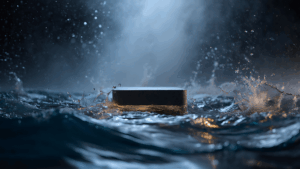With thousands of miles of coastline around the UK, coastal pollution is a huge problem. Whether it’s caused by the rubbish that blights our rivers, seas and oceans, run-off from agricultural pesticides and chemicals, sewage and solid waste, untreated wastewater, or debris from coastal erosion, coastal pollution can be a huge problem that affects wildlife conservation as well as humans.
While the media focus is on the big ocean clean-up operations, there is also an urgent need to address the UK’s coastal pollution. We’ve taken a look at some of the initiatives that have been set up to deal with the problem of coastal pollution.
Improving the marine environment with Geovation
The mapping agency, Ordnance Survey, established Geovation to help entrepreneurs who are trying to make the world a better place. In March this year, they announced two winning companies of the Diffuse Coastal Pollution Challenge. GlobalTrust and Satsense put forward innovative solutions to the problem of diffuse coastal pollution, and both propose using satellite technology to identify areas of coastal pollution. Both organisations will use their prize money to help them develop and implement their solutions.
Dealing with plastic waste and plastic-eating enzymes
Scientists at the UK’s University of Portsmouth and the National Renewable Energy Laboratory in the US are studying and re-engineering enzymes that eat and digest polyethylene terephthalate (PET) plastic, breaking it “back into its building blocks, creating an opportunity to recycle plastic infinitely and reduce plastic pollution and the greenhouse gases driving climate change”. Scientists have developed a cocktail of these enzymes which can break down PET plastics to their original building blocks within days. This would mean that plastics can be endlessly recycled rather than just once as is currently the case.
Marine pollution and the work of campaigning groups
The Marine Conservation Society is campaigning for cleaner seas by lobbying politicians and businesses, educating the public about the importance of keeping our seas clean, promoting sustainable fishing, and organising practical conservation activities. The message is clear: “only seas full of life can absorb carbon and help tackle climate change”. Society members are campaigning for at least 30% of UK waters to be effectively managed by 2030 in order to protect wildlife and ecosystems.
Sea Shepherd UK runs a Ghostnet Campaign where volunteer divers clear the sea bed of lost or discarded fishing gear. Sea Shepherd estimates that more than 150,000 seals, whales, dolphins and porpoises are killed by fishing gear every year, along with countless other sea creatures.
The UK’s Angling Trust sea campaigns lobby politicians about marine policy, encourage sea anglers to collect data, and promote practical measures anglers can take, such as recycling old fishing lines and litter picking.
City to Sea understands how much our daily actions can affect the coastal environment. Around 5.9% of beach litter in the UK is made up of items that have been flushed down the loo when they should have gone in the bin. Many of these items end up on beaches because of fatbergs blocking the drains, causing overflows in times of heavy rainfall. The group was set up to encourage all of us to live with less plastic.
Beach cleans
Rubbish on the UK’s beaches ends up in the sea, and rubbish in the sea ends up on our beaches. It’s a problem that the campaigning organisations have been trying to keep on top of for many years by rallying volunteers to take part in beach clean events.
The Marine Conservation Society has organised an annual Great British Beach Clean every September for nearly 30 years. In 2022 there was good and bad news. The good news was our amazing volunteers helped to pick up over 141,048 pieces of litter, weighing in almost 4,000kg – roughly the weight of 26 bottlenose dolphins. The average litter recorded per 100 metres is dropping year-on-year across the UK. An average of 369 items were found in 2022, compared to averages of 385 in 2021, 425 in 2020, and 558 in 2019.
The bad news is unfortunately, 93% of beaches around the UK found drinks-related litter (including glass and plastic bottles, cans, caps and lids), backing our longstanding call for a Deposit Return Schemes to be introduced to tackle this form of ocean pollution.
Surfers Against Sewage also organises regular beach cleans. The Million Mile Clean “will run every year until 2030, mobilising 1 million volunteers to clean over 10 million miles of UK landscape.”
And every spring, the Keep Britain Tidy campaign runs an annual Litter Clean which includes beach cleans and river cleans. The Great British Spring Clean and Great Big School Clean 2023 took place from 17 March to 2 April, participants were asked to pledge to pick up a bag of litter – or more – throughout the campaign.
It is up to us all to do what we can at an organisational level as well as a personal level to keep our coastal areas pollution free. The health of our country and the economic prosperity of our seaside resorts depends on it.
How your business can help
As individuals and businesses, we can all do our part too, not only by taking steps to use less water, but also to stop flushing wet wipes or tipping fats, oils, and grease down the sink. Minimise the amount of chemicals and oils that you put down the drain, especially important for businesses in the Industrial and Manufacturing sector, and businesses that dispose of trade effluent. Make sure your car or fleet of company cars are well maintained, and check to make sure there are no leaks, so oil and antifreeze/coolant don’t have the chance to leak onto the ground.
Use our Water Efficiency resources to make improvements in your business that will lead to a positive impact on economic and environmental sustainability.



